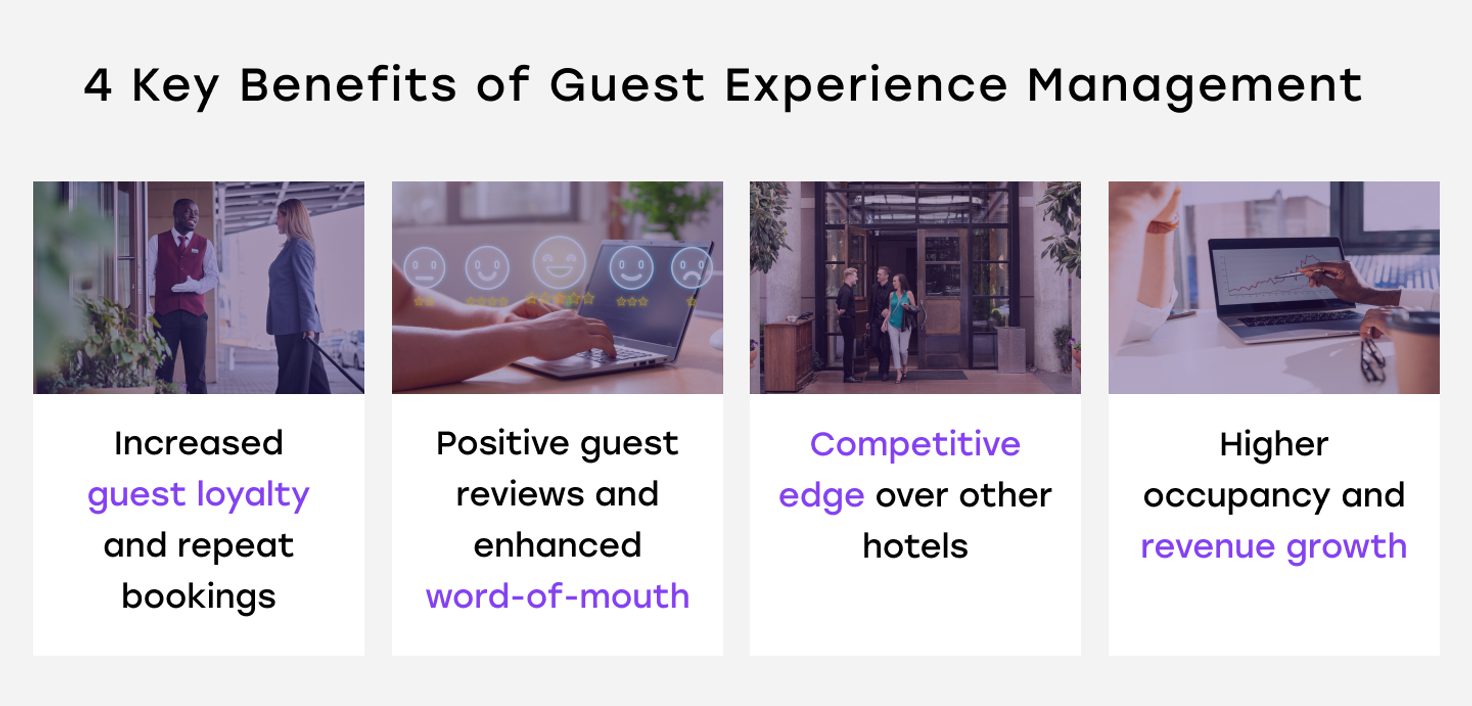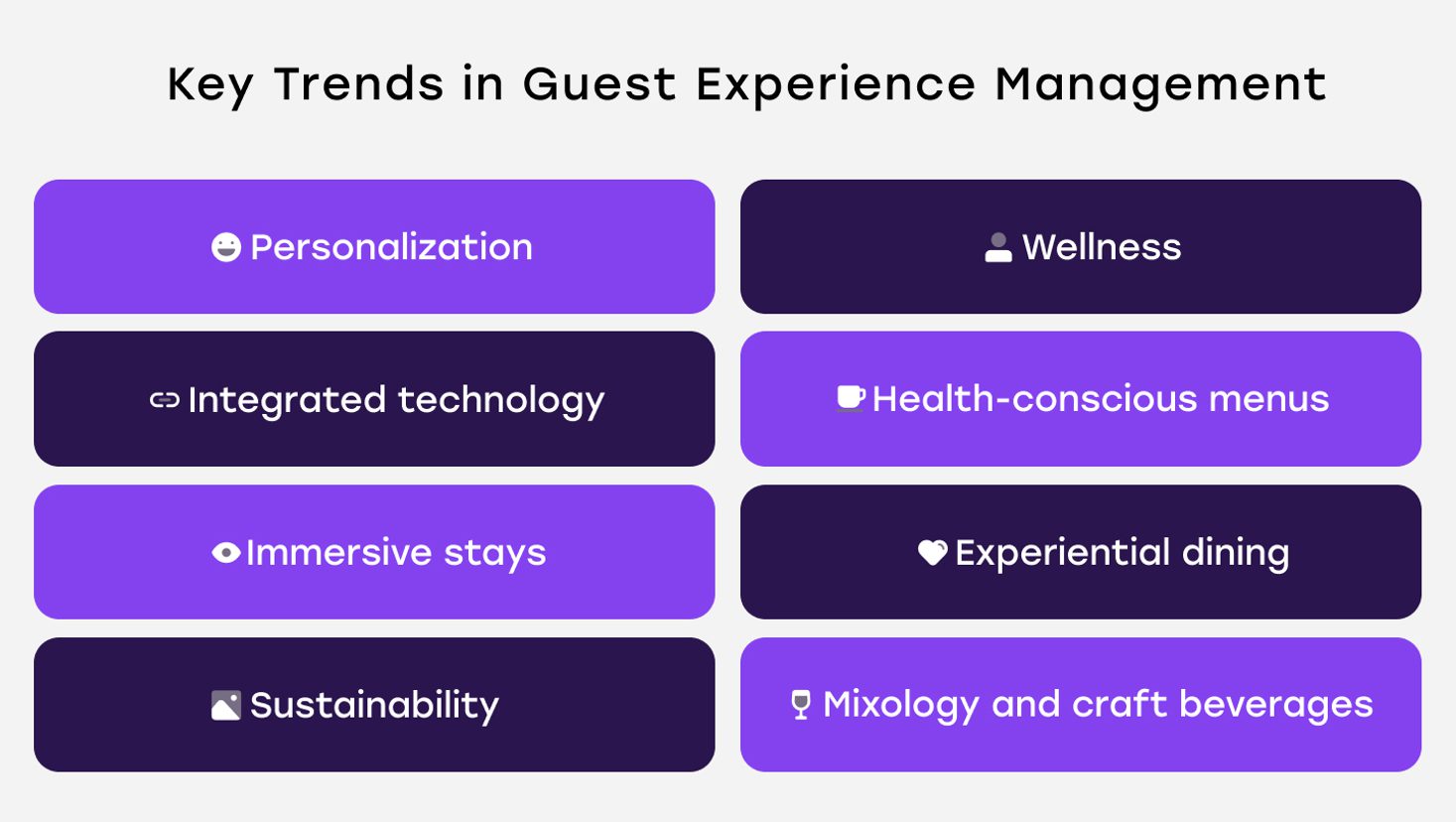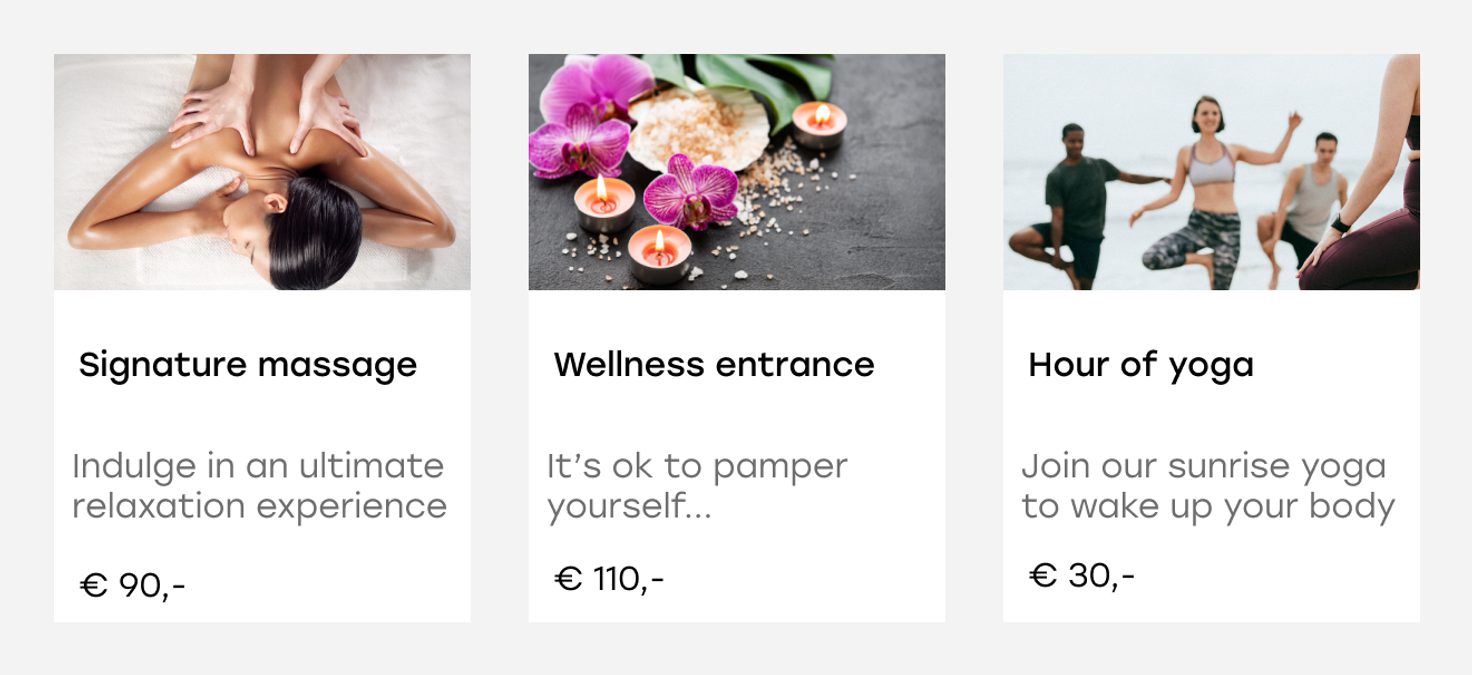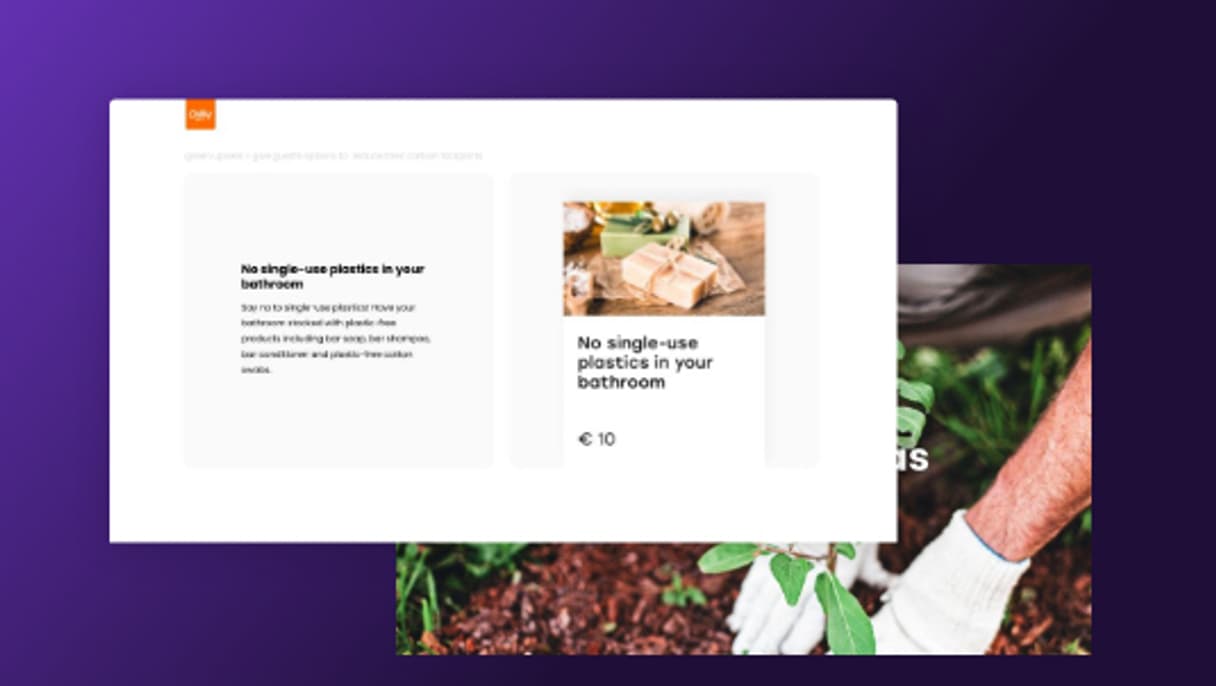Practical guide to guest experience: How-tos and trends
Oaky
•

Creating a standout hotel guest experience involves more than just meeting the expectations of your guests. It requires a deep understanding of what makes each stay unique.
Here’s a look at trends that are currently shaping guest expectations and will make for unique stays. Uncover how to ensure your offering delivers exceptional guest experiences before guests even check in.

What is guest experience?
The term guest experience refers to the overall impression that hotel guests form during their stay. It’s a comprehensive journey that includes every interaction from pre-arrival to post-departure.
What’s more important, though, is defining what a great guest experience entails. It’s more than just a pleasant stay. It involves not settling for just meeting the needs of your guests but exceeding their expectations.
What is the difference between the guest experience and customer service?
Guest experience and customer service differ in terms of scope, approach, and impact. Here’s how:
Scope
The guest experience encompasses all touchpoints across the entire guest journey.
In contrast, customer service addresses immediate needs and issues that arise during interactions. It focuses on specific interactions.
As such, customer service does have an impact on the broader guest experience.
Approach
The guest experience takes a proactive approach. It’s aimed at creating a memorable, personalized experience and emotional connection with guests.
Customer service, on the other hand, is reactive. Its goal is to address immediate needs and resolve issues.
Impact
The guest experience aims for long-term satisfaction and increasing customer loyalty by enhancing overall perceptions. Customer service seeks to resolve issues quickly and effectively to ensure short-term satisfaction.
Why is guest experience management important?
Guest experience management (GEM) is the strategic approach used in the hospitality industry to create and maintain exceptional guest experiences. It involves managing and improving every interaction a guest has with a brand or property, from initial contact to post-stay follow-ups.
Effective guest experience management is essential for several reasons that include:

Increased guest loyalty: Loyal customers are more likely to make repeat bookings and recommend your property to others.
Positive reviews: Getting good reviews on social media channels and online review sites and replying to them can enhance your online reputation and attract more bookings. In fact, a survey completed in five European countries in 2024 found that 44% of consumers rated businesses replying to online reviews as very or extremely important.
Competitive advantage: Exceptional guest experiences set your property apart from competitors, making it a preferred choice among potential guests.
Revenue growth: Satisfied guests are more likely to spend more on additional services and recommend the property to others.
What are the 5 key steps of the guest experience?
The guest experience typically unfolds in a series of key steps.
Here are the five essential steps in the guest experience:
1. Pre-arrival
The guest journey begins even before guests set foot on your property. It consists of the following substages:
Awareness and research: Guests first become aware of a property or service through marketing efforts, online reviews, and recommendations.
Booking: This involves the process of selecting dates, room types, and additional services. It should be seamless and informative. Guests should be given options that cater to their preferences.
Pre-arrival communication: This includes sending booking confirmations, welcome messages, pre-arrival instructions, and personalized offers. It helps to set the tone for a positive guest experience and make them excited about their upcoming stay. As guests are most likely to book an upgrade and customize their stay further by purchasing additional services and add-ons, it’s the perfect time to start with hotel upselling.
2. Arrival
During the arrival stage, you get to build on the first impressions you created with your booking process and guest communication. Ensuring a smooth check-in process at the front desk is the key focus now.
The check-in process involves more than verifying their reservation and providing the right room keys or access information. It presents an opportunity to make your guests feel welcome and their presence valued.
It’s also crucial for front desk agents to set a rapport with the guest and build a connection. This paves the way for uncovering their needs and true expectations of their stay at the property. Knowing what these are can take upselling to the next level. The goal of upselling shouldn’t only be to boost hotel revenue but also to add real value to the guest experience.
3. Stay
The focus shifts to service quality and meeting immediate needs during the guest's stay. Ensure that accommodations are clean, comfortable, and equipped with the necessary amenities.
While not an essential amenity, incorporating smart home devices can enhance the comfort of guests’ stay further. These types of devices can also improve guest service interactions.
Guest service interactions, from housekeeping to concierge, should be responsive and professional. By automating certain tasks, your hotel team has more time to focus on personalizing their guest interactions.
4. Departure
A seamless check-in experience creates a positive first impression. A hassle-free checkout process leaves a lasting impression. The focus during this step is on:
Handling any final payments and ensuring all charges are correct
Offering assistance with luggage/transportation or future bookings
Wishing them safe travels.
While efficiency is key during the departure stage, it’s also an opportunity to encourage guests to share their experiences through feedback. Asking for feedback still gives you a chance to address any issues and prevent a negative experience from turning into a negative review.
5. Post-stay
Engaging with guests post-stay through thank-you emails, satisfaction surveys, review requests, and a loyalty program helps maintain a connection and encourages future stays. This is also another opportunity to address any feedback and improve your offering for future guests.
8 Key Trends in Guest Experience Management

1. Personalization
Personalization is key to creating memorable guest experiences. A survey completed among senior marketers across the globe identifies improved customer experience as the biggest benefit of personalization. Customer retention and increased revenue were listed as the second leading benefits.
Not only can it have a massive impact on the guest experience, but it also boasts impressive success rates. The same survey reveals that only 5% of marketers rated their strategies as unsuccessful.
Special occasions like birthdays present the perfect opportunity to incorporate personalization. But with current technology, you can go beyond birthdays and personalize your guest experiences further. Use data from your property management system or hotel upsell software to understand guest preferences and make these milestones even more special.
By leveraging data, you can tailor services and room upgrade offerings to your guest segments to meet their unique needs. For example, with Oaky, Elite Hotels of Sweden creates various guest segments to ensure that their business and leisure guests receive deals that they’ll find more relevant. This has helped them to increase service and upgrade sales by 27.7%.
2. Using integrated technology
There are a number of hotel tech solutions that will not only streamline your operations but also improve the guest experience. Three that stand out are hotel upsell software, a revenue management system, and guest-facing technology like smart home devices:
You can, for example, integrate hotel upsell software with your property management system (PMS). This way, you can ensure a seamless data exchange and sync between the two systems, which means less manual work. This also allows for an increase in guest request approval rates thanks to the accurate availability and pricing in the hotel upsell software.
Adding a revenue management system to the mix is also beneficial. With dynamic pricing matching the demand and occupancy trends, your guests can upgrade their experience at optimal prices. This will benefit your profitability as well to make it a win-win solution.
Implementing guest-facing technology is also important for elevating the guest experience. Smart home devices and contactless options can delight guests.
For example, Pullman Dresden Newa has a robotic butler that can take a selection of drinks and snacks directly to a guest’s room. The hotel offers this as an add-on deal via hotel upsell software, serving as a great example of how you can add a touch of creativity to your upselling deals.
3. Immersive stays and authentic local experiences
Guests are looking for unique and immersive experiences rather than just a place to stay. Ideas for turning stays into immersive experiences include offering themed rooms and local cultural experiences at your hotel.
In fact, you can also make the booking process more immersive by using virtual reality (VR). This way, new guests can imagine themselves enjoying the local cultural experiences and themed rooms before they step into your hotel. It serves as another example of how you can improve the hotel guest experience during the pre-arrival stage.
In addition, you can partner with local businesses that offer unique activities and excursions.
More and more guests seek authentic local experiences that connect them with the local area. According to online data, 54% of travelers consider culture an important factor when choosing a destination, compared to 49% for attractions.
For example, Avani Sepang Goldcoast Resort (Malaysia) offers a 2-hour deal where guests can plant dragon fruit trees at a local eco farm. Another creative experience is offered by Anantara Golden Triangle (Thailand). As part of their pre-arrival upsell deals, they invite guests to book a Royal Enfield Classic 500 sidecar experience, allowing guests to explore the local area and soak in the culture from the comfort of a sidecar.
4. Sustainability and eco-friendly practices
Guests are increasingly concerned with environmental impact. Data shared by the Statista Research Department reveals that 80% of travelers across the globe view sustainable travel as important.
Examples of how you can adopt green practices include:
Reducing single-use plastics
Implementing energy-saving measures
Offering eco-friendly amenities
Rewarding guests who choose to skip daily housekeeping with a complimentary drink or any other perk
Serving meals from locally sourced ingredients
Donating leftover food to local charities or let your guests pick up the remaining food at a discounted price.
5. Wellness and well-being
The focus on health and wellness is growing, with many hotels offering wellness programs, on-site fitness facilities, yoga classes, and healthy dining options. The trend reflects a broader interest in maintaining a balanced lifestyle while traveling. You can even go as far as hosting a three-day wellness retreat.
6. Health-conscious menus
Offering healthy menus appeals to guests with specific dietary preferences as well as those who value sustainability and wellness.
Guests are increasingly interested in menus that feature organic, plant-based, locally sourced, and allergen-free choices. To respond to this guest's need, you can start offering more nutritious and diet-specific meals.

7. Experiential dining
A global survey completed by Hilton and Ipsos reveals that travelers’ top focus is on culinary experiences (especially among Gen Z and millennials). To tap into this trend, you can curate unique, themed menus that reflect local culture, seasonal ingredients, or specific culinary traditions.
Another option is adding interactive elements to dining experiences. Guest engagement is an ingredient that can turn an average dining experience into an engaging, food-related experience that generates repeat business. You can, for example, host cooking classes, chef’s tables or wine tastings to create memorable moments for guests.
8. Mixology and craft beverage trends
Like with activities, guests are also choosing a local flavor when it comes to liquor. Think craft cocktails, local wines, and artisanal spirits.
Try to add an interactive element as well. How about hosting mixology classes or tastings featuring local or boutique producers?
6 Best Practices for Delivering Exceptional Guest Experiences
However, knowing the trends is not enough to elevate the guest experience. The next step would be incorporating them into your day-to-day activities. Here’s how to do this:
1. Train staff members
Ensure your team is trained to deliver high-quality service. The focus should be on consistently providing high-quality service to meet and exceed guest expectations.
This involves explaining to them the importance of the hotel guest experience. You need their buy-in as they’ll be asked to go above and beyond.
2. Enhance guest communication and accessibility
Communication is foundational to improving the overall guest experience. You need to keep guests informed about hotel services, amenities, and any changes that may affect their stay.
You should also make it easy for guests to reach out with questions or concerns.
Use multiple communication channels, such as phone calls, mobile apps, email, live chat and SMS. Not only does this enable guests to reach you via their preferred channel, but it also helps you to stay top of mind across various touchpoints.
3. Harness hotel upselling software
Hotel upselling software like Oaky provides a central hub for your upselling efforts, helping you to keep track of your room upgrades, deals and unique experiences and presenting them to guests at the most opportune times of the guest journey. This makes it easy to ensure consistency for your upselling strategy across the board, track results and motivate your team.
If integrated two-way with your PMS, you can also significantly reduce manual work with availability and pricing synced from your PMS. This way, purchased deals and room upgrades can be synced back without your team’s involvement.
4. Personalize guest’s stays
To personalize guest experiences, one should start using technology. Hotel upselling software such as Oaky can enable personalization at scale.
Through segmentation, hoteliers can make sure they present personalized deals and services to target guest segments. Personal touches like remembering guest names, special requests, and past stays can make a significant impact. You can, for example, use their past stays and suggest room upgrades, dining options, or local activities. Or provide special options for loyalty members.
5. Maintain cleanliness and comfort
Like service delivery, overall cleanliness also has a huge impact on guest satisfaction. It’s very difficult to bounce back if the first impressions are that your hotel doesn’t meet the hotel standard for cleanliness.
Regularly inspect rooms and common areas to meet high hygiene standards and ensure all areas of the hotel are clean and well-maintained.
Then, provide high-quality bedding, pillows, and amenities to ensure guests have a comfortable and restful stay. After all, while the areas should be sterile, you don’t want your ambiance to be described in the same way.
6. Gather and act on guest feedback
Regularly gather feedback through surveys and reviews to identify areas where you can improve. You should also pay special attention to negative reviews and address any issues or concerns raised with the guests directly.
Key takeaways
Creating a positive guest experience is vital for the long-term success of any property in the hospitality industry. If you can’t impress guests during their first stay (ideally with their very first impressions), you’ll have a much harder time getting good occupancy rates throughout the year.
Like with other industries, if you make customer satisfaction a top priority, you will generate repeat business. After all, there can be no service to offer, if you don’t have guests to whom you can offer it.
Ensure that you understand the guest journey and key moments when you improve the overall guest experience. Also, stay on top of trends and identify best practices to help you leverage these trends. This is how you ensure that your guests have exceptional experiences that lead to increased customer loyalty, positive reviews, and more bookings.


